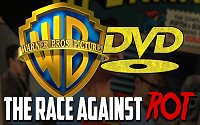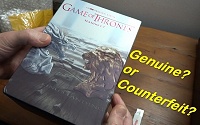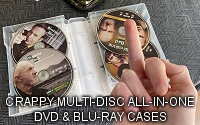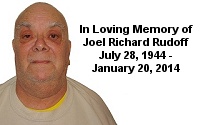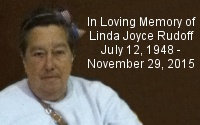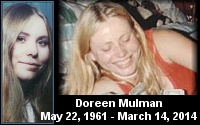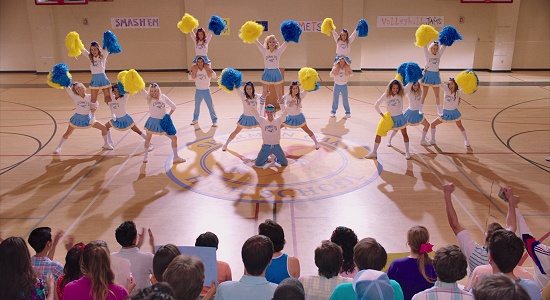Valley Girl (2020) Blu-ray Review
By Paul Rudoff on Oct. 4, 2020 at 9:42 PM in Home Video

Valley Girl (2020) is a film that just can't catch a break. MGM first announced a musical remake in February 2012, but it was halted until November 2016. Casting announcements continued until May 2017 and principal photography began that same month. Following the completion of filming, MGM scheduled the film for release on June 29, 2018. However, the film was delayed following controversies surrounding actor Logan Paul, who portrays Mickey. The film was then going to get a wide theatrical release in 2020, but the pandemic put the kibosh on that, forcing the studio to give it a direct-to-digital release on May 8, 2020 instead (aside from a few simultaneous drive-in screenings). Well, after all of the controversy and bad luck surrounding this film, is it any good? Read on to find out...

Valley Girl (2020) tells the story of teen Julie Richman (Jessica Rothe), who is steeped in the excessive, brightly-colored culture of the San Fernando Valley, complete with her narcissistic boyfriend, Mickey (Logan Paul). However, at a party, Julie falls for an edgy Hollywood punk named Randy (Josh Whitehouse), and the two begin an unlikely romance. Torn between fitting in with her superficial friends and embracing a more non-conformist lifestyle, Julie ultimately has to decide to stay with Mickey or take a risk with Randy.

Directed by Rachel Lee Goldenberg, the film is a musical romantic comedy adaptation of the 1983 film of the same name. That means that it has two things working against it. (1) It's a remake of a beloved cult classic. (2) The original was set in 1983 and filmed in 1983, whereas this film is trying to re-create 1983 from 35 years later. (Since the film was meant for a 2018 release, I see the "present day" depicted in it as being 2018, and not 2020. I will refer to it as such.)

The film stars several of my favorite actresses: the immortal Jessica Rothe as Julie Richman, magnificent Mae Whitman as Jack, cutie Chloe Bennet as Karen, Judy Greer as Julie's mom Diana, and an uncredited Alicia Silverstone as the older Julie. The notable male cast members include Josh Whitehouse as Randy, Rob Huebel as Julie's dad Steve, and cameos from Randall Park as Principal Evans and Thomas Lennon as KROK's Rodney Bingenheimer.

The story, be it in the remake or the original, is your basic Romeo & Juliet "boy/girl from the wrong side of the tracks". Hence the names Randy and Julie for our star-crossed lovers. The original film didn't hide this when it had our leads standing in front of a theater marquee advertising the film "Romeo & Juliet". The major difference is that the 2020 Valley Girl is a jukebox teen musical; the kind of self-conscious hits-packed revue that has become a regular fixture on Broadway. The movie has its faults, but most of them can actually be reasoned away given the plot device at work. All of the 1983 scenes are a story being told by mother Julie (Alicia Silverstone) to her daughter Ruby (Camila Morrone) in 2018. After the opening "We Got The Best" mall dancing scene, the movie cuts back to present day where the daughter stops the story and asks, "You were singing and dancing on a fountain?" Mom Julie replies, "That's how I remember it. That's what it felt like." This tells us, the audience, that what we're watching - with all of its bright neon colors and stylized appearance - is just someone's fantasized version of 1983, and not the reality of it. That's why it's okay that the movie feels like a 2018 person's idea of what 1983 was like, complete with inaccurate haircuts and lack of proper speech patterns and accents. Much like The Princess Bride (reviewed here), there are several times when present day interrupts the story, and I suspect that the daughter interjects a few times without the movie cutting back to present day. This explains why Julie, in the 1983 story, suddenly comments, "and it's not like I have some kind of satellite phone device I can keep in my pocket and just transmit to outer space and call you guys whenever I want to". That's the daughter adding a sarcastic remark into the story that her mother is telling her (and us). That said, there is one MAJOR fault with this movie. If the 1983 story is being told by older Julie, how it is that she can include scenes at which her younger self was not present? For example, there's a scene in Randy's apartment between him and Jack talking about their band. She wasn't there, so how does she know what happened and what was said between the two?

The 2020 film features one of my most hated tropes of "recent period pieces": the "look at this thing from the past with future hindsight" trope. It's also known as the "this thing from the past will never be obsolete" trope. You get that here when Julie's father comes out with a VHS camcorder and marvels at having a "mini VCR" in his hands, and later when the father wants to invest in Commodore instead of Macintosh (Apple). The filmmakers always think that they're making a wink and a nod to the modern audience, but they're really just pulling the audience out of the story. These types of references never seem authentic because no one at the time really spoke like that. No one ever marvels at any current technology because it's always just accepted as a normal part of life. It's only put into perspective decades later when there is hindsight to see it in the proper context.

There is some "modernization" over the original, such as the inclusion of a black valley girl (the original had four white girls) and Randy's best friend now being a lesbian (instead of a guy). I have no issues with that, especially since the lesbian Jack is played by the adorably awesome Mae Whitman. One of the biggest changes in the new version is with Julie's parents. In the original, they were hippies that ran a health food restaurant, who were cool with Julie dating Randy. Here, they are yuppies who are adamantly against Julie dating Randy because he's not from the Valley and could ruin her chances of getting into a good college. The new version also adds in some melodrama for Randy, who feels restless about his band's fame being relegated to the local scene instead of happening on a grander scale.

Most of the songs from the 1983 original are not found here. The musical aspect favors more traditional '80s pop songs. So, expect to hear the cast's renditions of hits made popular by Cyndi Lauper, Toni Basil, the Go-Go's, Joan Jett, Madonna, and others. According to the end credits, all of the actors did their own singing, which is commendable. A highlight of the musical numbers is a spirited aerobics mash-up sung by Jessica Rothe, Ashleigh Murray, and Chloe Bennet that melds "Just Can't Get Enough", "Material Girl", "I Can't Go For That", and "Tainted Love" into one. "Melt With You", which was the signature love song of the original, is used in the climax as a tribute to the first film.

(Heidi Holicker [Stacey in the original] as Mrs. H)
Fans of the original are going to complain that the remake sucks because it eschews the punkness and genuineness of the original. The original wasn't high art, either. I watched it just prior to watching the remake, and while I liked it, it's hardly the "classic" every one makes it out to me. I think those people who hold it in high regard lived through the era as teenagers and cling to the movie was a reminder of "better times". It's nothing more than an average Romeo & Juliet story with a peek at Elizabeth "E.G." Daily's cute breasts. Nothing more, nothing less.

(Elizabeth "E.G." Daily [Loryn in the original] as Mickey's Mom)
Several of the valley girls from the original movie make cameo appearances in the remake. Deborah Foreman (Julie in the original) plays the "Shopgirl" who comments on the pink prom dress, Elizabeth "E.G." Daily (Loryn in the original) plays Mickey's Mom (seen talking at the party's poolside bar), and Heidi Holicker (Stacey in the original) plays Mrs. H (the woman at the pep rally who comments, "Check out that bod").

(Deborah Foreman [Julie in the original] as Shopgirl)
All of the footage seen as the gang goes cruisin' in Hollywood (aside from the shots of them in the car) is taken from the original 1983 film. When we see a person getting food at a hot dog stand, remake Randy asks him, "Do you have my money?" In the original movie, Randy asks this same guy why he didn't go through with getting a Mohawk haircut. When they get out of the car, Jack now delivers Randy's classic line, "Okay, but when they attack the car, save the radio."
Valley Girl (2020) is presented in the 1.85:1 aspect ratio with a runtime of 1:42:45. Audio languages include English and English Descriptive. The film includes English SDH subtitles.

This is the most basic Blu-ray I've ever seen by a major studio of a new-release recent movie. There are no extra languages, be it audio tracks or subtitles. There are no special features, not even a trailer. Hell, there aren't even boot-up ads/trailers. Well, I guess that's a positive. It's not like there aren't any ready-made special features that they could have included. For starters, there's a trailer for the film, as well as a few brief featurettes, and an official music video for "We Got The Beat" - all of which are embedded below. Besides that, I would have LOVED to have seen all of the Peyton List deleted scenes. Peyton played a cheerleader named Courtney who sang a rendition of "Call Me" by Blondie during the pep rally scene. That song (which still appears on the digital soundtrack), along with most of her scenes, were cut from the film, even though she still receives front-end credit. If you look carefully, you can spot her at the pep rally as the cheerleader being held aloft in the middle of the squad. She has no lines in the final film at all, though that's her that you hear on vocals for the song "Mickey". I don't know if it's Warner Brothers or MGM who just didn't care, but it's clear that one of the two studios just did the bare minimum here.
A digital copy code voucher is also included in the standard one-disc Blu-ray case. The first print run includes a slipsleeve.

The film doesn't take itself seriously, and neither should you. It's meant to be harmless fun. A comedy satire using the story from "Valley Girl", but had it not used that title (so as to draw comparison to the original), it would have just as easily worked if they titled it "1983: The Musical". It's a jukebox musical love letter to the 1980s. Valley Girl (2020) is available on Blu-ray and DVD. The 1983 original with Nicolas Cage and Deborah Foreman is also available on Blu-ray and DVD. The Valley Girl (2020) soundtrack album is available as Digital MP3s. While I recommend the film to anyone who enjoys 1980s music and romantic comedies, it's hard to recommend this disc (or even the DVD) since there is no meat on these bones. Wait for a price drop to justify the bareness of these disc releases.
Images were framegrabbed by me (Paul Rudoff) from the Blu-ray and/or taken from the IMDB gallery of the film (where I contributed a dozen framegrabs from the Blu-ray). Videos were found on the official Orion Pictures YouTube channel. This item has been provided by Warner Brothers for review on this site.
No feedback yet
Leave a comment
| « 300 (2007) 4K UHD + Blu-ray Combo Pack Review | Little Monsters (1989) Blu-Ray Review (Vestron Video Collector's Series #19) » |






